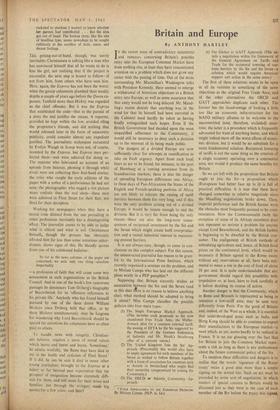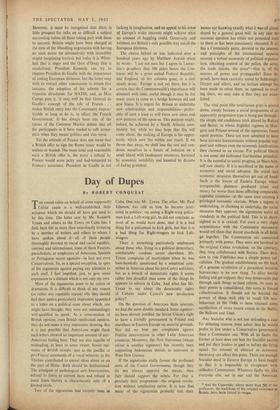Britain and Europe
HARTLEY By ANTHONY Ithe recent mass of contradictory statements land rumours concerning Britain's possible entry into the European Common Market have done nothing else, at least they have concentrated attention on a problem which does not grow any easier with the passing of time. Out of the mists surrounding Mr. Macmillan's Washington talks with President Kennedy, there seemed to emerge a withdrawal of American objections to a British entry into Europe, as well as some assurance that that entry would not be long delayed. Mr. Maud- ling s recent denials that anything was in the wind (or that he himself had been outvoted in the Cabinet) need hardly be taken as having finally extinguished such hopes. Even if the British Government had decided upon the most. unqualified adherence to the Community, it would still be necessary to deny such a decision up to the moment of its being made public.
The dangers of a divided Europe are now sufficiently clear for attempts at reunification to take on fresh urgency. Apart from such local fears as arc to be found, for instance, in the port of Hamburg at a coming severance from its Scandinavian markets, there is also the danger of spreading European differences into Africa; in these days of Pan-Africanism the States of the English and French-speaking portions of Africa are not likely to tolerate the raising of tariff barriers between them for very long, and if this were the only problem arising out of a divided Europe, it would be reason enough to end the division. But it is very far from being the only reason—there are also the long-term conse- quences of reciprocal investment by the Six and the Seven which might create both overproduc- tion and a vested industrial interest in maintain- ing present barriers.
It is not always easy, though, to come to con- clusions on this complex subject. For this reason, the uninstructed journalist has reason to be grate- ful to the International Press Institute, which recently organised a seminar on the problem, and to Miriam Camps who has laid out the different plans neatly in a PEP pamphlet.* Supposing that Britain sincerely wishes an association bitwecn the Six and the Seven (and at this date tlicre is no reason to believe anything else), what method should be adopted to bring it about? Miss Camps classifies the possible policies into four main types: (1) The Single European Market Approach. (This includes such proposals as the now
abandoned Free Trade Area, the Miller- Armack plan for a common external tariff, the joining of EFTA by the Six suggested by the President of the German Federation of Industry and Mr. Heath's Strasbourg offer of a customs union.) (2) The 'United Kingdom Join the Six' Ap- proach. (Presumably this would also have to imply agreement for such members of the Seven as wished to follow Britain together with a form of association for countries such as Austria or Switzerland who might find their neutrality compromised by joining the Community.)
(3) The OECD or Atlantic. Community Ap- proach.
* FOUR APPROACHES TO THE EUROPEAN PROBLEM.
By Miriam Camps. (PEP, 3s. 6d.)
(4) The Global or GATT Approach. (This en- tails a negotiation within the framework of the General Agreement on Tariffs and Trade for the reciprocal lowering of cus- toms barriers by the Six and the Seven—a solution which would require American support and action in the same sense.) The first of these solutions seems to be open in all its varieties to something of the same objections as the original Free Trade Area; and of the other alternatives the OECD and GATT approaches duplicate each other. The former has the disadvantage of looking a little too like an economic infra-structure for the NATO military alliance to be welcome to the uncommitted (and, therefore, excluded) coun- tries; the latter is a procedure which is frequently advocated for want of anything better, and which might indeed stave off the worst effects of econo- mic division, but it would be no substitute for a more fundamental solution. Reciprocal lowering of tariffs is not the same thing as the creation of a single economy operating over a continental area, nor would it produce the same benefits for Britain.
So we are left with the proposition that Britain ought to join the Six—a proposition which (Europeans had better face up to it) is full of practical difficulties. It is true that these have changed somewhat in relative magnitude since the Maudling negotiations broke down. Then, imperial preference and the British farmer were the obstacles most frequently pointed to by com- mentators. Now the Commonwealth (with the exception of some of its African members) does not represent so serious a problem for anyone except Lord Beaverbrook, and the British farmer is beginning to be dwarfed by the British con- sumer. The realignment of British methods of subsidising agriculture and, hence, of British food prices on the continental level, which would be necessary if Britain agreed to the Rome treaty without any reservations at all, have been esti- mated to mean a rise in the cost of food of about 10 per cent. It is quite understandable that any government should regard this possibility with trepidatior or, at least, have to look carefully at it before deciding its course of action.
Another danger is that the Community, which in Bonn and Brussels is represented as being in intention a low-tariff area, may be seen very differently from Paris. For the good of Britain and, indeed, of the West as a whole, it is essential that underdeveloped areas such as India and Hong Kong should be able to continue to export their manufactures to the European market—a need which, as yet, seems hardly to be realised in France. It is no.use glossing over the fact that for Britain to join the Common Market repre- sents a risk as long as there is any ambivalence about the future commercial policy of the Six.
To mention these difficulties and dangers is to realise that the words 'signature of the Rome treaty' mean a good deal more than a simple signing on the dotted line. Such an act must be preceded by some sort of negotiation, in which matters of special concern to Britain would be discussed just as they were in the case of each member of the Six before the treaty was signed. However, it must be recognised that there is little prospect for talks on so difficult a subject succeeding unless all those taking part wish them to succeed. Britain might have been charged at the time of the Maudling negotiation with having no such desire (or alternatively with incredibly stupid bargaining tactics), but today it is White- hall that is eager and the Quai d'Orsay that is recalcitrant. President Kennedy can try to impress President de Gaulle with the importance of ending European divisions, but the latter may wish to extract other concessions in return (for instance, the adoption of his scheme for a tripartite directorate for NATO), and, as Miss Camps puts it, 'it may well be that General de Gaulle's concept of the role of France . . . makes British entry into the Community imprac- ticable so long as he is, in effect, the French Government.' It has always been one of the curses of the Common Market debate that all the participants in it have tended to talk econo- mics when they meant politics and vice versa.
Yet the attitude of France does not mean that a British offer to sign the Rome treaty would be useless or wasted The more total and reasonable such a British offer is, the more a refusal by France would seem petty and bad-tempered to France's associates. President de Gaulle is not lacking in imagination, and an appeal to his sense of Europe's wider interests might achieve what no amount of haggling could. Generosity and boldness are Britain's only possible way out of the European dilemma.
The choice before us was indicated over a hundred years ago by Matthew Arnold when he wrote: 'I am not sure but I agree in Lamar- tine's prophecy that 100 years hence the Con- tinent will be a great united Federal Republic, and England, all her colonies gone, in a dull steady decay.' Europe is not yet there, but it is certain that the Commonwealth's importance will diminish with time, useful though it may be for many years to come as a bridge between old and new States. It is urgent for Britain to undertake new relationships and responsibilities—prefer- ably of such a kind as will force new ideas and new patterns of life upon us. This purpose might, indeed, be achieved by a North Atlantic com- munity, but, while we may hope that this will come about, the making of Europe is the oppor- tunity which now lies within our reach. If we throw that away, we shall lose the rest and con- demn ourselves to a future of isolation on a small island with inadequate resources, harassed by economic instability and haunted by dreams of fading grandeur.







































 Previous page
Previous page